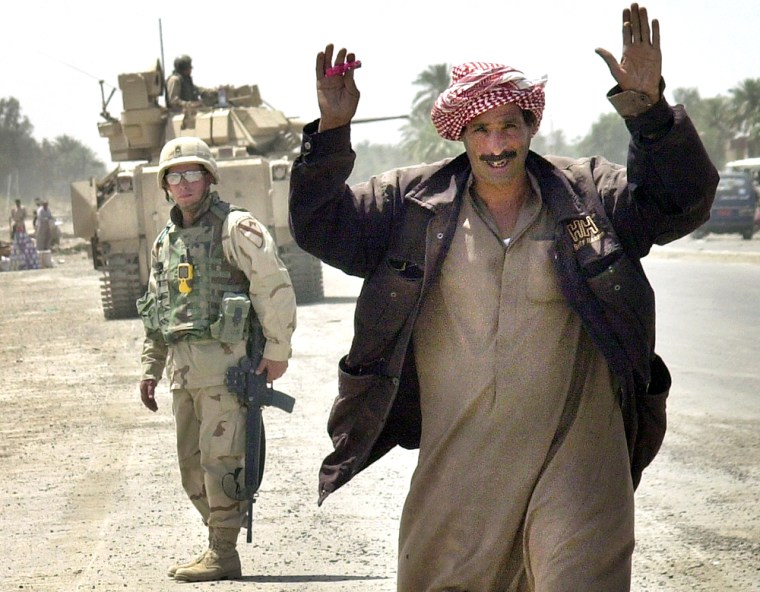Mortar fire slammed into a marketplace in Baghdad’s biggest Shiite Muslim neighborhood, and a roadside bomb hit a bus Saturday, a day that saw at least 33 Iraqis killed in multiple attacks. Outside Baghdad, insurgents rocketed a U.S. military base, killing four soldiers.
In Sadr City, the capital’s sprawling Shiite slum, angry residents vented anger at Iraq’s U.S. occupiers after the mortar barrages, which followed an early morning clash in the neighborhood between U.S. troops and militiamen loyal to a radical Shiite cleric.
The worst single incident of the day came when a bomb exploded on a main road as a bus passed near Haswa, 30 miles south of Baghdad. The back of the bus was shredded and seats crumpled. At least 13 people — including a four-year-old boy — were killed and 17 wounded, said Wasan Nasser, a doctor at Iskan Hospital in neighboring Iskandariyah.
U.S. warnings on Fallujah
The violence came as U.S. commanders repeated warnings that they may launch a new assault on the besieged city of Fallujah soon, saying guerrillas had not abided by a call to surrender their heavy weapons.
L. Paul Bremer, the top U.S. administrator in Iraq, traveled to the U.S. Marines base outside Fallujah for consultations Saturday, while Brig. Gen. Mark Kimmitt told reporters: “Should there not be a good faith effort demonstrated by the belligerents inside Fallujah, the coalition is prepared to act.”
The launching of the siege on April 5, along with the revolt in the south by Shiite cleric Muqtada al-Sadr’s militia, fueled a flare-up of insurgent violence across the country.
The four U.S. solders were killed around dawn, when two rockets were fired from a truck and slammed into the base in Taji, 12 miles north of Baghdad, Air Force Lt. Col. Sam Hudspath said. U.S. helicopter gunships then destroyed the truck, the military said.
Six soldiers were wounded in the attack, three of them critically, the military said. The military had initially reported that a fifth soldier died of his wounds afterwards, but later said that report was incorrect.
The deaths, along with that of a Marine announced Saturday, brought to 106 the number of U.S. troops killed in Iraq since the beginning of April. The military announced the death of a soldier in a non-combat incident, bringing to 715 the number servicemembers who have died in the country.
Anywhere from 900 to 1,200 Iraqis have been killed in April — depending on various reports of the death toll from Fallujah.
Mortars strike Sadr City
Some of the mortar shells in Saturday’s barrage against Sadr City, which killed at least seven people, hit two miles from any U.S. position — suggesting they may have deliberately targeted civilians in the Shiite neighborhood.
Three shells pounded the neighborhood’s main souk, known as the Chicken Market, just as morning crowds were gathering to shop. Human flesh could be seen among scattered market stalls and burned-out cars. Craters were blasted out of the asphalt.
At least six Iraqis were killed and 38 wounded, said Yassin Abdel-Qader, a doctor in the area’s Health Directorate. The Baghdad slum is home to more than 1 million people.
Hours later, a projectile struck a two-story house, smashing through its roof and down into the ground floor, tearing a woman to pieces as she took an afternoon nap and wounding her daughter. At least two more landed later in the afternoon, hitting a main street on the edge of Sadr City, breaking windows but causing no casualties.
Iraqis called the projectiles rockets, but the U.S. military said mortars were fired.
Before the mortar fire, U.S. troops launched a pre-dawn raid into Sadr City, pursuing al-Sadr militiamen. They did not capture the targets they sought but got caught in a gunbattle in which two Iraqis were killed, according to U.S. Maj. Phil Smith.
During the fighting, a shell pierced the wall of a house, exploding in a bedroom and severely burning a 9-year-old girl and two teenage girls as they slept.
U.S. Army Brig. Gen. Mark Kimmitt suggested former members of Saddam Hussein’s security services were to blame.
“It was clearly an attack on civilians. There was no U.S. military at that spot,” said Lt. Col. James Hutton of the Army’s 1st Cavalry Division, which responded to the attack and helped treat the wounded. The closest U.S. post is nearly 2 miles away from the market, a division spokesman said.
But angry Shiites blamed the Americans for the assault.
After one of the afternoon strikes, residents chanted, “Long live al-Sadr, America and the Governing Council are infidels.”
In other violence Saturday:
- Three boats exploded near an Iraqi oil platform and two oil tankers off the Persian Gulf coast on Saturday evening, a British military spokesman said, in what appeared to be coordinated suicide attacks. There was no immediate word on casualties or damage from the blasts, Capt. Hisham H. Halawi said.
- An Iraqi woman working as a translator for the U.S. military was shot and killed along with her husband as they drove to a U.S. base, a hospital official said.
- A roadside bomb went off, destroying a car carrying Iraqis near a U.S. base on a downtown street in the northern city of Tikrit, hometown of former Iraqi leader Saddam Hussein and a center for anti-U.S. resistance. Four Iraqis — two police and two civilians — were killed and 16 people were wounded, the U.S. military said.
- Polish troops clashed overnight with Shiite militiamen in the city of Karbala, killing five, a spokesman for the multinational peacekeeping force in south-central Iraq said Saturday. A day earlier, followers of radical Shiite cleric Muqtada al-Sadr attacked Bulgarian troops in the city, killing one soldier.
- Gunmen attacked a U.S. convoy near the city of Kut, and an armored vehicle was in flames.
